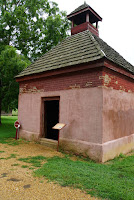Hey there Campers,
Well, we are on the move
again. We say good bye to D.C. area and are heading south again. I was texting
my friend Rosalyn Morgan Upshaw while I was in the African American Museum and
she informed me we had to go to the Shirley Plantation in Virginia. When Roz says go you go. I just hear
her principal voice speaking. Soooo… we headed there.
As we drive down the dirt
road to the plantation we see crops. We were trying to determine if it was
cotton or what. Well we will find out later.
We got there for the last
tour of the day. Of course it started to rain again. When I entered to buy the tour
tickets I spoke to the gardener and asked how long did he think the rain would
last. He started to laugh and said “you must not be from here.” Told him nope I
was a Cally girl. He really laughed and told me he was San Jose, CA. He came
because of the military and stayed. Come to think about it he never said how
long that rain would last.
The Shirley Plantation is
the oldest plantation in Virginia and the oldest family own business in America.
It was founded in 1613. Edward Hill I established it on the James River. Construction
started on the house in 1723 when Elizabeth Hill married John Carter and
completed in1738.
One of the greatest things about the
house is the inside stair case. One
architectural historian contends,” Shirley Plantation is the most intact 18th
century estate in Virginia”. Several features such as the “Flying Staircase”
and the Queen Anne Forecourt are the only remaining examples in North America
of this architectural style.” When you look at the staircase it is literally
hanging in the air. The stairs are made of black oak. Floors are made of black
pine. The plantation sits on 700 acres.
Charles Carter (John’s
son) was the biggest slave owner in Virginia. He owned 785 slaves. His son
Robert was very much against slavery. Robert Carter
once wrote to his children, "[f]rom the earliest point in time when I
could distinguish right from wrong, I conceived a great distaste for the slave
trade and all its barbarous consequences." Although Robert died before he
could inherit Shirley, he stipulated in his will that the slaves were to remain
on the plantation and that slave families were not to be separated when Shirley
was divided between his four children. Robert's eldest son and inheritor, Hill
Carter, did not free Shirley's slaves. He did, however, practice more humane
ownership. Much of the documentary evidence of slavery at Shirley came
from Hill Carter, who began keeping records when he officially inherited
Shirley at the age of 20 in 1816. His meticulous journals record doctor's
visits, weddings, funerals, runaways, shoes lists, and construction of quarters
for all of his slaves. These original receipts remain in the Shirley Plantation
archives today. (By Virginia Foundation for the
Humanities)
Charles Carter's
daughter, Ann Hill Carter, was born at Shirley in 1773. She married Light-Horse
Harry Lee and gave birth to General Robert E. Lee. Yep, the same one
from the Civil War.
All the brick that
all the building are made from were hand made by the slaves. The slave quarters
were 1 mile from the main house. The quarters were 2 story cabins. 2 families
slept in there. The house slaves slept in the laundry and store room. These
slaves were kept separate from the field slaves.
The brides in the
Hill-Carter family have traditions that they when they get engaged they scratch
their name in the window to make sure the engagement ring is real. They call it
“proving the stone.” If not real no marriage.
Hill Carter and his 7
sons enlisted in the Confederate Army. When General McClellan sailed up the
James River to capture and burn Richmond he had over 750 wounded soldier. The
women in the house came out and took care of the sick. They did not worry about
the color of the uniforms. McClellan gave the order for the plantation not to
be touched.
The original crop of
the plantation was tobacco. Tobacco is hard on the land. It depletes the soil. Cotton
is still grown as part of a crop rotation of cotton, corn, soybean and wheat
and pecans.
The 11th generation Hill-Carter
family still lives in the plantation. They live on the 2 & 3 floors.
As
we leave the plantations, we look at the crop along the road. Yep, it is
cotton.

Thank
you Roz for the suggestion of this stop.
Well,
campers until next time.
Lo
& Bren











Hahahah, yes, if Miss Rosalyn says go, you go...
ReplyDelete